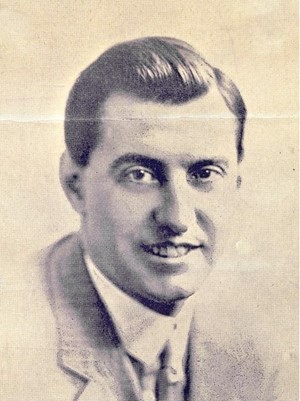The year was 1921, a 28-year-old evangelist by the name of William Booth-Clibborn had just completed a successful tent revival south of Sacramento, in a town called Lodi, California. Enthused by the results, Mr. Clibborn suggested the revival party continue more meetings in southern California and an additional tent was set up in a town called, Holtville.
After attaining all the necessary permits and ordinances, heavy rains and low attendance literally quenched the fiery services. Unable to pay the costs for the week of failed meetings, Booth-Clibborn and his helpers found themselves working as field hands, harvesting corn in the local fields in order to settle their unpaid debts. The evangelist, still dejected from the failed meetings and not accustomed to the job at hand, had hit rock-bottom.
But, it was in the middle of those cornfields, overtaken with self-pity, the Lord began to deal with the dejected evangelist. Little did he know that the Spirit of God would give him the words to one of the greatest hymns ever written and a favorite of God’s prophet.
My heart is thrilled; that's my favorite song. If you only knew the backgrounds for that song. My friend composed that song: Booth Clibborn. In a cornfield one night with his elbows out and on his knees out there in prayer, God give him this song. And I think it's one of the—it's matchless for this day when the deity of Jesus Christ is denied by so many formal believers, that He was no more than just a man, just a prophet. He was Emmanuel.
54-0321 What Think Ye Of Christ?

William Booth-Clibborn
In 1908, Arthur Booth-Clibborn (dad) learned of a growing group of Pentecostals holding meetings in London, England. The family had its roots in the UK, so he persuaded his youngest son, William, to join him on the trip to visit the revival. It was on one of the train rides, Arthur asked his 15-year-old son, “William, don’t you think you ought to yield your heart to God afresh?” It was this question that stirred his young heart. He had lost the zeal of his repentance he had experienced as a school boy, and he approached the London meetings with a renewed hunger for God.
Arriving at the meetings, both dad and son were immediately attracted to what they were seeing and hearing. It was in these services that young William was fascinated by the angelic singing and the phenomenon of speaking in tongues. His dad spoke eight languages and William spoke five, but none of the languages they were hearing were recognizable by either.
A Baptist convert, who had just received the Holy Ghost a few days before, was the speaker at the Booth-Clibborn’s first service. During the altar call, young Booth-Clibborne accepted the invitation, and made a desperate repentance, praying until early morning. In the coming days, the dad and son attended more Spirit-filled meetings in houses and different venues. He became almost frantic for his own experience he had seen other experiencing: the Baptism of the Holy Spirit.
One night, at the continuation of the meetings, he again went to the altar. It was there that something happened, stating:
I found myself singing in a beautiful language entirely foreign to me. Its charm and surprising sounds saturated me with an indescribable ecstasy. Every sweet sentence fully and adequately expressed the pent-up feelings of my inflamed heart . . . Direct from the altar of my heart, rising in surging burning billows, the most pleasing incense was reaching the Throne!
This began his experience of faith that landed him into the early Assemblies of God and the Pentecostal movement, and eventually to those cornfields in southern California where he made, what many of us would say, was the greatest contribution of his life:
I wish I had the voice of a singer. If I should have the voice of a singer just now, I would love to sing to you my favorite hymn, wrote by my precious friend, William Booth-Clibborn.
Down from His glory, the ever living story,
My God and Saviour came, and Jesus was His Name.
Borned in a manger, to His own a stranger,
The God of sorrow, tears and agony.
O how I love Him! How I adore Him!
My life, my sunshine, my all in all!
The great Creator became my Saviour,
And all God's fullness dwelleth in Him.
What condescension, bringing us redemption;
When in the dead of night, not one faint hope in sight; (Then the forked lightning came!)
God, precious, tender, laid aside His splendor,
Stooping to a manger, a stable full of manure, to be borned in.
Stooping to woo, to win and save my soul.
O how I love Him! How I adore Him!
My breath, my sunshine, my all in all!
The great Creator became my Saviour,
And all God's fullness dwelleth in Him.